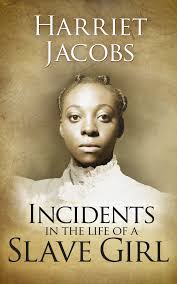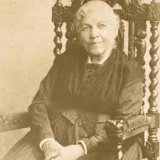Incidents in the Life of a Slave Girl Page #7
Incidents in the Life of a Slave Girl, written by herself is an autobiography by Harriet Jacobs, a mother and fugitive slave, published in 1861 by L. Maria Child, who edited the book for its author. Jacobs used the pseudonym Linda Brent.
When my grandmother returned home and found her youngest child had fled, great was her sorrow; but, with characteristic piety, she said, "God's will be done." Each morning, she inquired if any news had been heard from her boy. Yes, news was heard. The master was rejoicing over a letter, announcing the capture of his human chattel. That day seems but as yesterday, so well do I remember it. I saw him led through the streets in chains, to jail. His face was ghastly pale, yet full of determination. He had begged one of the sailors to go to his mother's house and ask her not to meet him. He said the sight of her distress would take from him all self-control. She yearned to see him, and she went; but she screened herself in the crowd, that it might be as her child had said. We were not allowed to visit him; but we had known the jailer for years, and he was a kind-hearted man. At midnight he opened the jail door for my grandmother and myself to enter, in disguise. When we entered the cell not a sound broke the stillness. "Benjamin, Benjamin!" whispered my grandmother. No answer. "Benjamin!" she again faltered. There was a jingle of chains. The moon had just risen, and cast an uncertain light through the bars of the window. We knelt down and took Benjamin's cold hands in ours. We did not speak. Sobs were heard, and Benjamin's lips were unsealed; for his mother was weeping on his neck. How vividly does memory bring back that sad night! Mother and son talked together. He asked her pardon for the suffering he had caused her. She said she had nothing to forgive; she could not blame his desire for freedom. He told her that when he was captured, he broke away, and was about casting himself into the river, when thoughts of her came over him, and he desisted. She asked if he did not also think of God. I fancied I saw his face grow fierce in the moonlight. He answered, "No, I did not think of him. When a man is hunted like a wild beast he forgets there is a God, a heaven. He forgets every thing in his struggle to get beyond the reach of the bloodhounds." "Don't talk so, Benjamin," said she. "Put your trust in God. Be humble, my child, and your master will forgive you." "Forgive me for what, mother? For not letting him treat me like a dog? No! I will never humble myself to him. I have worked for him for nothing all my life, and I am repaid with stripes and imprisonment. Here I will stay till I die, or till he sells me." The poor mother shuddered at his words. I think he felt it; for when he next spoke, his voice was calmer. "Don't fret about me, mother. I ain't worth it," said he. "I wish I had some of your goodness. You bear every thing patiently, just as though you thought it was all right. I wish I could." She told him she had not always been so; once, she was like him; but when sore troubles came upon her, and she had no arm to lean upon, she learned to call on God, and he lightened her burdens. She besought him to do likewise. We overstaid our time, and were obliged to hurry from the jail. Benjamin had been imprisoned three weeks, when my grandmother went to intercede for him with his master. He was immovable. He said Benjamin should serve as an example to the rest of his slaves; he should be kept in jail till he was subdued, or be sold if he got but one dollar for him. However, he afterwards relented in some degree. The chains were taken off, and we were allowed to visit him. As his food was of the coarsest kind, we carried him as often as possible a warm supper, accompanied with some little luxury for the jailer. Three months elapsed, and there was no prospect of release or of a purchaser. One day he was heard to sing and laugh. This piece of indecorum was told to his master, and the overseer was ordered to re-chain him. He was now confined in an apartment with other prisoners, who were covered with filthy rags. Benjamin was chained near them, and was soon covered with vermin. He worked at his chains till he succeeded in getting out of them. He passed them through the bars of the window, with a request that they should be taken to his master, and he should be informed that he was covered with vermin. This audacity was punished with heavier chains, and prohibition of our visits. My grandmother continued to send him fresh changes of clothes. The old ones were burned up. The last night we saw him in jail his mother still begged him to send for his master, and beg his pardon. Neither persuasion nor argument could turn him from his purpose. He calmly answered, "I am waiting his time." Those chains were mournful to hear. Another three months passed, and Benjamin left his prison walls. We that loved him waited to bid him a long and last farewell. A slave trader had bought him. You remember, I told you what price he brought when ten years of age. Now he was more than twenty years old, and sold for three hundred dollars. The master had been blind to his own interest. Long confinement had made his face too pale, his form too thin; moreover, the trader had heard something of his character, and it did not strike him as suitable for a slave. He said he would give any price if the handsome lad was a girl. We thanked God that he was not. Could you have seen that mother clinging to her child, when they fastened the irons upon his wrists; could you have heard her heart-rending groans, and seen her bloodshot eyes wander wildly from face to face, vainly pleading for mercy; could you have witnessed that scene as I saw it, you would exclaim, Slavery is damnable! Benjamin, her youngest, her pet, was forever gone! She could not realize it. She had had an interview with the trader for the purpose of ascertaining if Benjamin could be purchased. She was told it was impossible, as he had given bonds not to sell him till he was out of the state. He promised that he would not sell him till he reached New Orleans. With a strong arm and unvaried trust, my grandmother began her work of love. Benjamin must be free. If she succeeded, she knew they would still be separated; but the sacrifice was not too great. Day and night she labored. The trader's price would treble that he gave; but she was not discouraged. She employed a lawyer to write to a gentleman, whom she knew, in New Orleans. She begged him to interest himself for Benjamin, and he willingly favored her request. When he saw Benjamin, and stated his business, he thanked him; but said he preferred to wait a while before making the trader an offer. He knew he had tried to obtain a high price for him, and had invariably failed. This encouraged him to make another effort for freedom. So one morning, long before day, Benjamin was missing. He was riding over the blue billows, bound for Baltimore. For once his white face did him a kindly service. They had no suspicion that it belonged to a slave; otherwise, the law would have been followed out to the letter, and the thing rendered back to slavery. The brightest skies are often overshadowed by the darkest clouds. Benjamin was taken sick, and compelled to remain in Baltimore three weeks. His strength was slow in returning; and his desire to continue his journey seemed to retard his recovery. How could he get strength without air and exercise? He resolved to venture on a short walk. A by-street was selected, where he thought himself secure of not being met by any one that knew him; but a voice called out, "Halloo, Ben, my boy! what are you doing here!"
Translation
Translate and read this book in other languages:
Select another language:
- - Select -
- 简体中文 (Chinese - Simplified)
- 繁體中文 (Chinese - Traditional)
- Español (Spanish)
- Esperanto (Esperanto)
- 日本語 (Japanese)
- Português (Portuguese)
- Deutsch (German)
- العربية (Arabic)
- Français (French)
- Русский (Russian)
- ಕನ್ನಡ (Kannada)
- 한국어 (Korean)
- עברית (Hebrew)
- Gaeilge (Irish)
- Українська (Ukrainian)
- اردو (Urdu)
- Magyar (Hungarian)
- मानक हिन्दी (Hindi)
- Indonesia (Indonesian)
- Italiano (Italian)
- தமிழ் (Tamil)
- Türkçe (Turkish)
- తెలుగు (Telugu)
- ภาษาไทย (Thai)
- Tiếng Việt (Vietnamese)
- Čeština (Czech)
- Polski (Polish)
- Bahasa Indonesia (Indonesian)
- Românește (Romanian)
- Nederlands (Dutch)
- Ελληνικά (Greek)
- Latinum (Latin)
- Svenska (Swedish)
- Dansk (Danish)
- Suomi (Finnish)
- فارسی (Persian)
- ייִדיש (Yiddish)
- հայերեն (Armenian)
- Norsk (Norwegian)
- English (English)
Citation
Use the citation below to add this book to your bibliography:
Style:MLAChicagoAPA
"Incidents in the Life of a Slave Girl Books." Literature.com. STANDS4 LLC, 2025. Web. 23 Feb. 2025. <https://www.literature.com/book/incidents_in_the_life_of_a_slave_girl_947>.








Discuss this Incidents in the Life of a Slave Girl book with the community:
Report Comment
We're doing our best to make sure our content is useful, accurate and safe.
If by any chance you spot an inappropriate comment while navigating through our website please use this form to let us know, and we'll take care of it shortly.
Attachment
You need to be logged in to favorite.
Log In